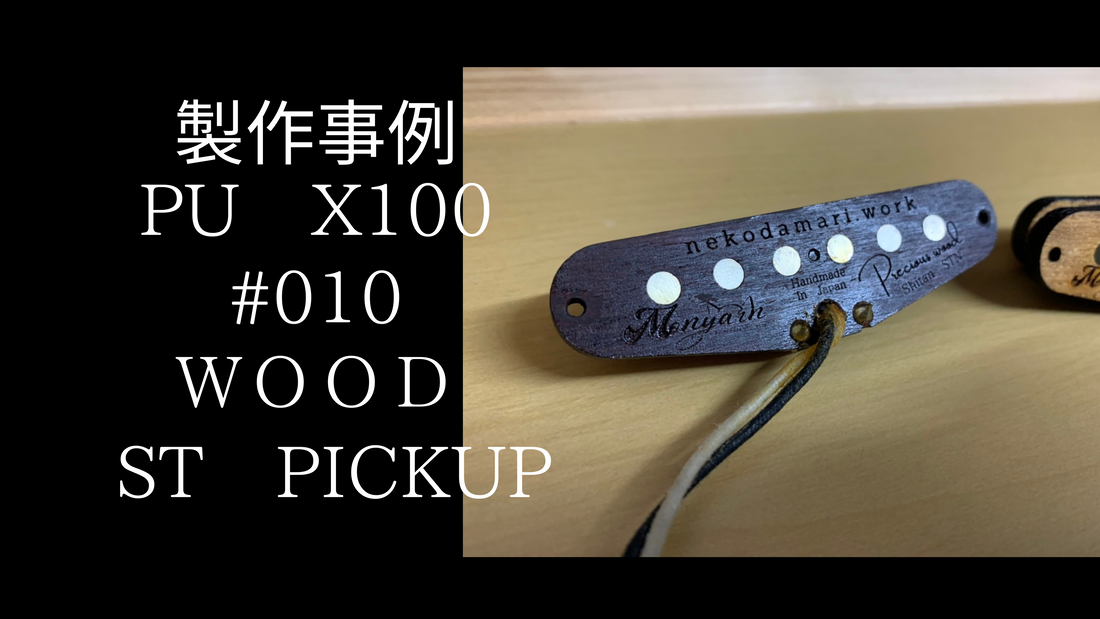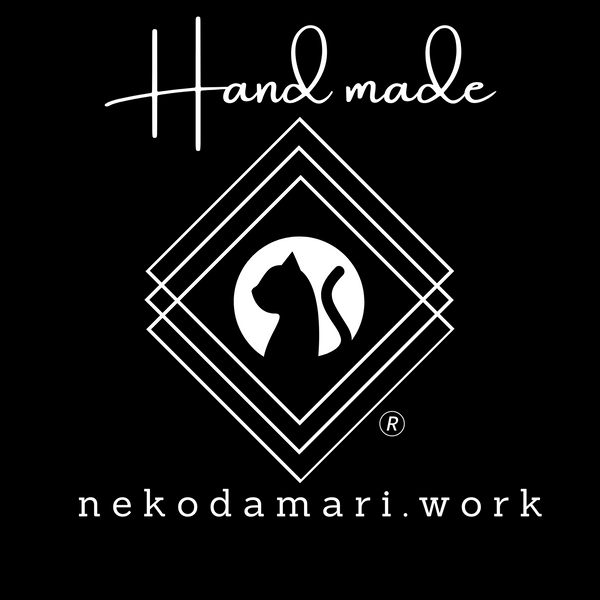
[Production example] X100 #010 WOOD ST pickup [Not for sale]
This is production example #010 of the featured project [X100] currently being held at Nekodamari Kobo.
For more information on the X100 project, please click here.
#010 Overview
As this is a milestone occasion, it is being produced using new materials.
First off, here is the exterior.


The silhouette is that of a typical ST pickup, but anyone who can identify the Hobbin material in this photo must be a serious wood geek.
Do you have a wooden pickup?
As we all know, guitars are made from wood (putting aside other materials for now).
So, the question is, "Are pickups made out of wood?" The answer is that there are almost no wooden ones.
Even if you have heard of or seen it, it is most likely a pickup with a wooden cover.
I think the wooden cover is made by cutting wood.
So what kind of guitars are they found on? They are often found in high-end guitars such as show models from foreign and domestic manufacturers that cost over 1,000,000 yen (1 million yen).
I don't think it's very common to be able to get replacement parts.
If there are pickups in the world that have wooden covers but the pickup inside is the same as usual, then we thought, "Then you'd want to make a pickup that's also made of wood inside," and that's how we created this.
Do wooden pickups actually work?
The fact that guitar manufacturers do not use it suggests the following hypotheses:
・The theory that "if you make it with a wooden hob, it won't make any sound. It's unusable."
- "It's possible to make it with a wooden hobbit, but it's difficult and unrealistic"
"There just weren't many manufacturers who thought about making it out of wooden hobbies."
The first theory that "it can't be used because it doesn't make any sound" was deemed unlikely. Wood is an insulator, and it is not a part that is subjected to a voltage that would cause insulation breakdown, so the idea is that it can be used.
This meant that I could think, "If I looked into it, I'm sure I would find someone somewhere in the world who can make things out of wooden hobbies," so by a process of elimination, I decided to make a prototype with the expectation that it would be "difficult, but possible to make."
The types of wood in the photo are rosewood-type "Zitan," which is sometimes used for guitar fingerboards, and ash-type "Tamo." The dark brown one is Zatan, and the yellowish one is Ash.
We also try making guitars out of woods such as "wenge" and "padauk," which have unique patterns that are also used for fingerboards and necks.

Challenges in production: Difficulty of production and individual differences in wood
Now, after making the prototype, we found several points that make it unsuitable for mass production.
・The production difficulty is simply high
The precision required for processing is quite strict. Above all, compared to resin, wood is an inhomogeneous material with different hardness and flexibility depending on the part.
Therefore, for example, pin 1 may be OK, but pin 3 may not be.
It seems that even in NC machining, machining methods with improved precision will become essential.
・Measures specific to wood: cracking, drying
Compared to resin, there is a risk of cracking due to drying. If it is a cover, you can just replace the cover at worst, but if the inside cracks, the pickup will break, so this risk is probably the biggest reason not to make it.
- Individual differences in wood
Another problem is that when using hard wood such as that used for guitar fingerboards, differences in hardness and dryness affect the processing. It seems that not only the ability to select wood but also research into processing methods is required.
・Individual differences in sound
The prototype is able to produce sound without any problems, but there was a problem...
Even when comparing ``Sitan'' and ``Tamo'', using the same magnet, copper wire, and number of turns, the sound tendencies are different...
For this reason, the possibility that sound tendencies may vary even among ``Sitans'' and the high possibility of individual differences are likely to be points that are excluded when manufacturers develop uniform products.

How to beat Nekodamari Kobo
At this stage, it appears that some of the anticipated risks mentioned above can be overcome.
The next two are the ones that you just have to deal with with determination.
・The problem of "difficulty of production"
⇒ I'll do something about it with determination. New equipment, new manufacturing methods, etc.
- The problem of "individual differences in wood"
⇒ I'll improve my judgment and do something about it. Things like how I buy things and how I dry them.
As for the remaining points, concrete measures can be taken.
- Problems with wood cracking and drying
⇒ Considering the process by which cracks occur due to drying, countermeasures can be taken if the shrinkage that occurs when the moisture content inside the wood changes due to the influence of outside air can be prevented.
At Nekodamari Kobo, we sometimes use a variation of our own beeswax for the potting process, which can be used to moisturize and protect the fingerboard.
We believe that by pre-treating the xylem of the hobbin with a penetrating moisturizer and combining it with a potting treatment that provides surface protection, it can be used as a practical pick-up.
Since we use methods that are not used in the general pickup manufacturing process, we expect that the risk of cracking at Nekodamari Kobo is generally low.
・The problem of "individual differences in sound"
⇒As mentioned above, it is expected that this issue can be resolved by using potting treatment.
Individual differences can also occur during the winding process. To reduce individual differences, it is necessary to reduce uncertainties by using consistent manufacturing methods such as "having the same effect," "using the same materials," and "using the same processing."
This is also the reason why Nekodamari Kobo pays close attention to the potting process.
We believe that we can maintain a consistent level of quality by standardizing the machines, winding methods, and materials of the pickups and then using the same potting process, which has the same effect.
Even if a slight error occurs in the winding process, if the same effect can be achieved in the subsequent processes, it is unlikely that the sound will be significantly different.
Therefore, even if there are manufacturing errors, we can provide a stable pickup that will not deviate significantly from the concept and direction defined by the product.
Even if there are individual differences in the wood, we believe that as long as the direction and concept are clearly defined, it is possible to create pickups that can be enjoyed with the same style.
That said, I don't like the idea of erasing individual differences, so I'm currently exploring ways from various angles to create a system that allows users to "enjoy individual differences."
Digression and Summary #010 Spec Introduction
The milestone #010 model is a wooden ST pickup.
Since there are no plans to sell this item, detailed information will not be provided.
I think wooden pickups would be interesting as an interchangeable replacement part, so I'd like to put one into production soon.
As things stand, it is difficult to produce them and individual differences are likely to occur, so we are currently researching ways to produce them consistently.
It would be even more interesting if we could tailor the sound characteristics to suit the type of wood.
#010 is being kept for research purposes and is not planned for sale. If a similar model is produced, we will make it available for sale. Please look forward to it.
#010 Specs
| Compatible models | ST type |
| Hobin Material | Wood: Rosewood, Ash |
| magnet | Alnico 5 flat pole piece |
| Copper wire | |
| Lead | Cross Wire |
| Potting Treatment | Low noise, mid-reinforced potting |
| Special Craftsmanship | |
| specification | |
| Resistance value | none |
| accessories |
none |
| Warranty details |
Not for sale, none |
| Notes | Not for sale, no description |
| Sales Information |
They are kept for research purposes and are not for sale. |
If you have any questions, please feel free to contact us.
Contact Us – Nekodamari Kobo Direct Online Store (nekodamari.work)
Nekodamari Kobo Co., Ltd.
